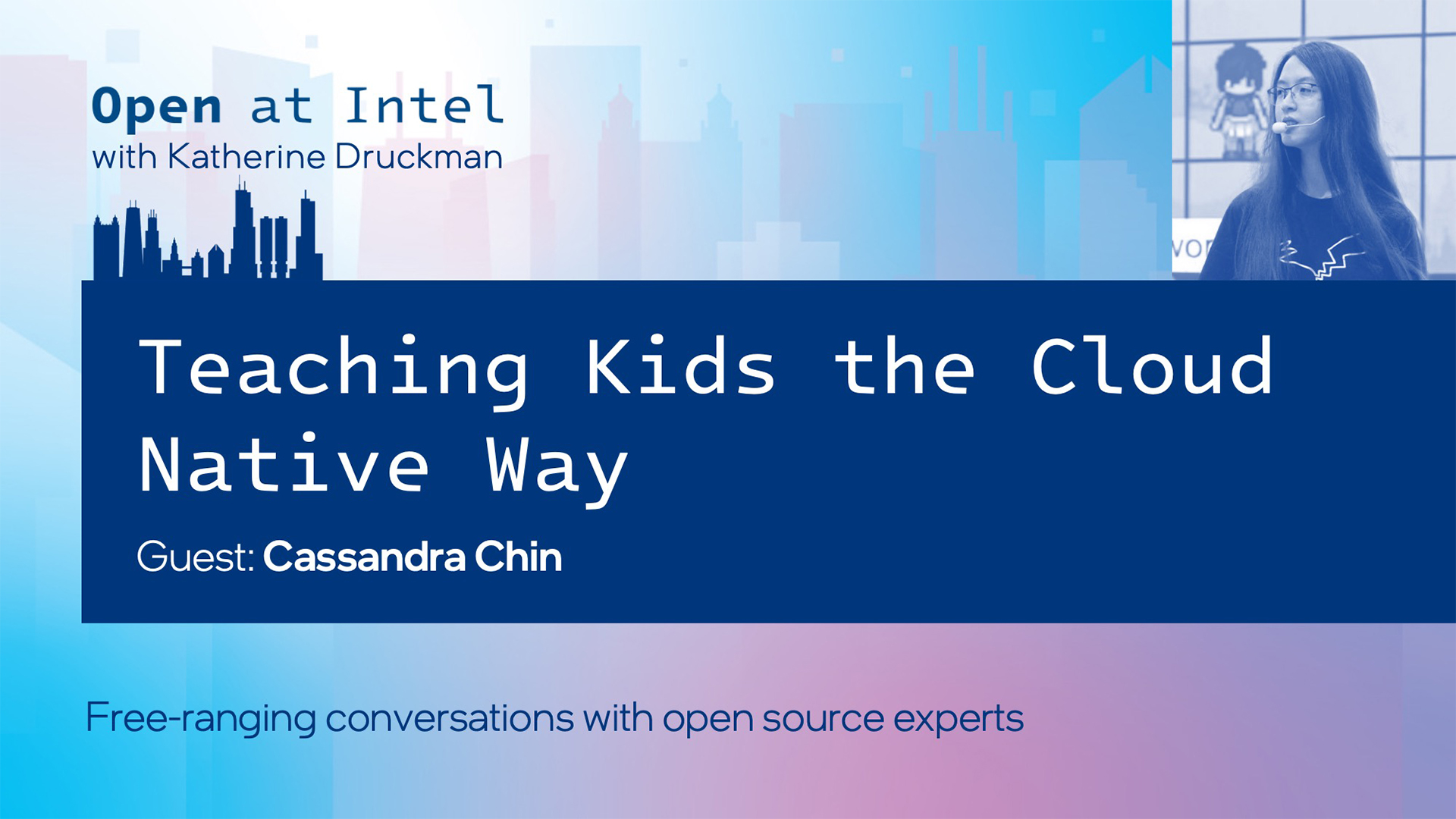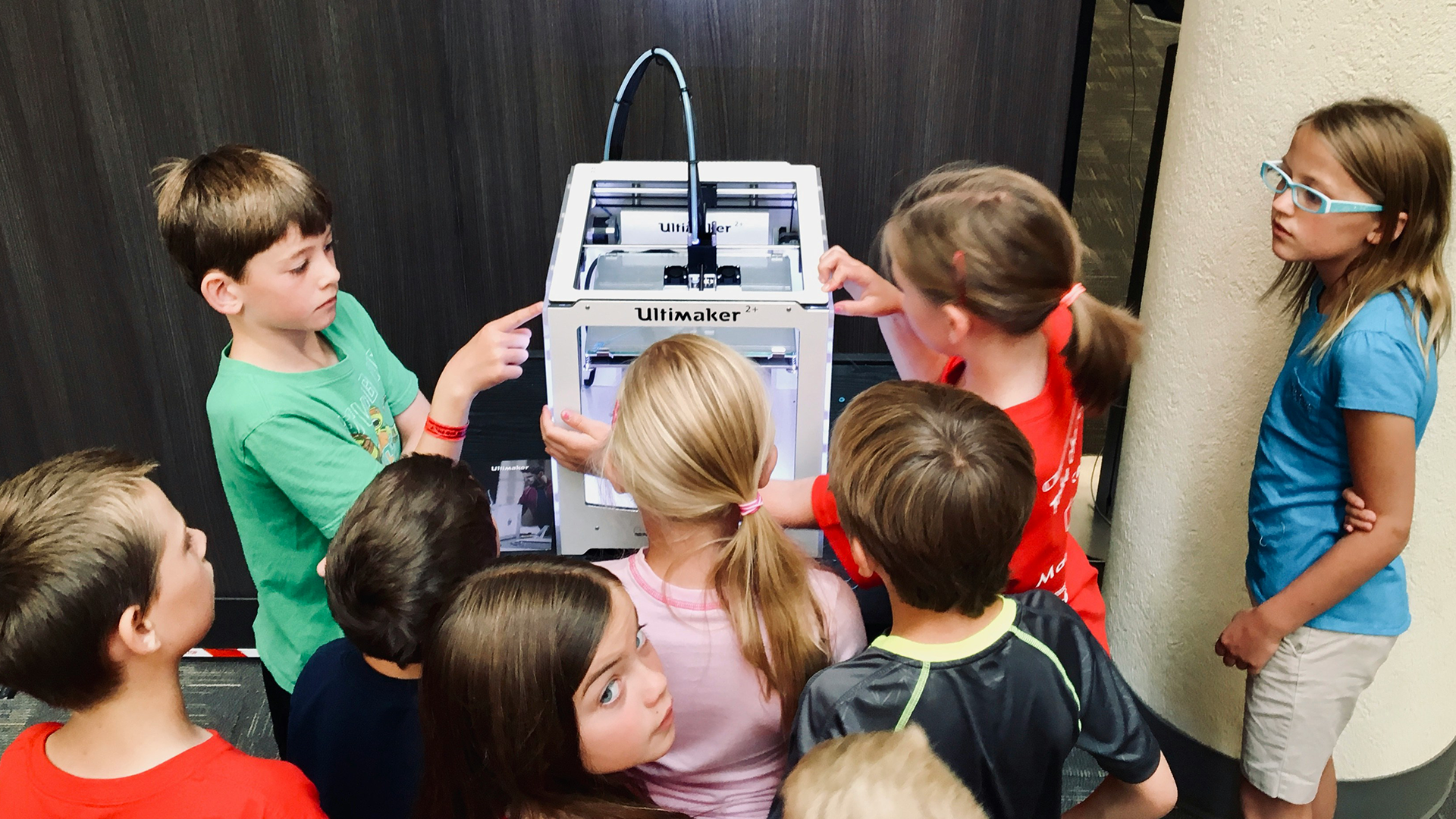As the world of software development and open source evolves at a rapid pace, it’s more important than ever to introduce technology at an early age. Cassandra Chin should know. After helping her dad instruct Cloud Native Computing Foundation (CNCF) Kid’s Day workshops starting at the age of 10, Chin, now a college student, designs and leads workshops to help kids learn how to code. We chatted with Chin at last fall’s KubeCon in Chicago to learn about the program.
Listen to the full episode here. This conversation has been edited and condensed for brevity and clarity.
Creating Unique Learning Environments
Katherine Druckman: Will you tell us about yourself and your role at CNCF Kid’s Day?
Cassandra Chin: I’m a college student and an instructor at CNCF Kid’s Day. The CNCF Kid’s Day is special to me because they bring in a lot of kids—more than 100 kids attended the event. In my workshop, I taught the kids Raspberry Pis and how to do some programming and hardware wiring. I had it themed after Phippy, the lovable giraffe mascot.
Katherine Druckman: Tell me a little bit about your workshop. What are you teaching?
Cassandra Chin: We give the kids a Raspberry Pi, a breadboard, and sensors, such as a button, a light sensor, and an accelerometer. We give them the tools, and they play a game on the Raspberry Pi using a little touch screen. In the game, Phippy and friends are on Captain Kube’s ship when they experience a shipwreck and get stranded on an island. While they’re on the island, pods run away with Phippy’s friends. The kids play as Phippy and rescue Phippy’s friends by catching the pods.
When the kids initially play the game, it’s impossible to win because the pods are too fast. Over the course of the workshop, we give them tools. The first tool is a button that gives Phippy a whistle that calls the pods over—but only two of them. Getting the button to work isn’t that simple. The kids must wire the button into the breadboard. Once they have it wired correctly, it still doesn’t work, so the kids have to code using nano, a low-level editor. They write one line of code, save it, exit the program, and run the game.
Katherine Druckman: What’s the age range of the kids?
Cassandra Chin: The youngest kid we had was eight, and the oldest was in early high school. The ideal age is around middle school age.
Katherine Druckman: Do most of the kids attend because their parents are in the industry, or do kids come because they’re interested independently of their parents?
Cassandra Chin: At this event, the parents brought their kids. But I’ve taught other workshops that talk to schools and bus in underprivileged kids, and I hope we can do that at the next KubeCon.
Katherine Druckman: How did you first get involved in the workshop?
Cassandra Chin: When I was around 10, my dad taught Raspberry Pi workshops. I’d watch him teach and volunteer to help him, and over time, I just kind of took over.
For this workshop, I wrote the new content for the Phippy theme. The theme has evolved over the years. It started as Mary Had a Little Lambda, where kids would herd sheep. It eventually moved into a zombie theme, where she was a zombie who burned in the sunlight. The third theme was Pokémon.
Katherine Druckman: Do you plan on teaching in the future?
Cassandra Chin: I plan on doing a new AI/ML workshop at KubeCon Europe in Paris. Right now, kids are just abusing ChatGPT to do their homework. I think they’re already into AI because they’re using it every day, so they’ll be excited to learn. I found a website for teaching kids how to use AI/ML that integrates with Scratch, the block coding program famous for teaching kids how to program.
The kids will use the AI integration to write their own AI/ML programs. So say you want to write a Scratch program with pictures of a happy face and a sad face. When you enter compliments, like “I’m happy today,” “I like you,” or “I’m going to the movies,” the face will be happy, and when you start insulting the face, it’ll be sad. To do this, kids will write the algorithm in the AI/ML website. They’ll create a happy box and a sad box and write in lots and lots of different kinds of compliments for the happy box and lots of sad things in the sad box. Once they’ve fed in lots of data, the website will turn that into a Scratch box you can use in your Scratch programs.
Katherine Druckman: What happens after the workshop? Are there resources to help kids continue learning when they go home?
Cassandra Chin: We plan on writing a book to help connect kids once they leave the workshop. It’ll be a 30-page, colorful Phippy book related to the workshop content. We’re going to make it easily accessible so they can share that book with their friends, families, and schools.
Katherine Druckman: Do you see the same kids returning each year?
Cassandra Chin: My workshops focus on introducing kids to get them interested, but maybe they’ll get engaged in a different program or pursue computer science later. We’re sparking that fire in them.
Katherine Druckman: What other activities does Kid’s Day offer?
Cassandra Chin: There was also a Minecraft modding workshop, a Scratch workshop, and a Sonic Pi workshop that involves music. Each workshop is two hours, and the students can choose two of the four workshops.

Chin’s Journey
Katherine Druckman: Tell me more about what you do. What are you studying?
Cassandra Chin: I’m getting a degree in computer science at Colorado State University Global. It’s an online program, so I get to go to cool conferences and still study and do my homework remotely.
Katherine Druckman: What do you see yourself doing when you graduate?
Cassandra Chin: I probably want to work for a technology company. I just want to gain a good basic coding foundation and become a developer, and then maybe I can branch out.
Katherine Druckman: Would you prefer to stay in the open source world?
Cassandra Chin: I enjoy open source software, but I’m not locking myself into anything.
Katherine Druckman: That’s a practical approach. I’m curious about your view of open source culture as someone in college.
Cassandra Chin: I really like open source—the idea that anyone can contribute, and it’s not locked into money or enterprise. I think people who work on open source have a stronger passion. But enterprise software is necessary too.
Katherine Druckman: One of my favorite things about going to open source conferences is going to a session you didn’t think you’d like, but suddenly you’re interested and inspired to try something new. Have you experienced anything like that recently?
Cassandra Chin: Personally, I feel like a lot of sessions are tailored to adults who are already in the industry. I’m interested in the technologies, but the way they explain the technology can be tricky for me to understand sometimes. I just need them to simplify the terminology a little.
I try to simplify the terminology a lot when I teach kids’ workshops. I’m hoping when I grow up, I can bring that to the adults. I’m sure there are many people who don’t completely understand aspects of presentations.
Katherine Druckman: That’s an astute observation. You might want to look into developer advocacy and evangelism because part of the job is to simplify ideas to make them more digestible. It sounds like you’d be good at that.
Cassandra Chin: I actually got myself into a little bit of developer advocacy because I taught my first actual adult session in Morocco a couple months ago. My session helped teach the adults how they can teach their kids to get into technology since I have a lot of experience with kids’ workshops. I plan on speaking at more conferences this year.
To hear more of this conversation and others, subscribe to the Open at Intel podcast:
- openatintel.podbean.com
- Google Podcasts
- Apple Podcasts
- Spotify
- Amazon Music
- Your favorite podcast player (RSS)
About the Author
Katherine Druckman, Open Source Evangelist, Intel
Katherine Druckman, an Intel open source evangelist, hosts the podcasts Open at Intel, Reality 2.0, and FLOSS Weekly. A security and privacy advocate, software engineer, and former digital director of Linux Journal, she’s a longtime champion of open source and open standards.
Cassandra Chin, Kid’s Day Instructor, CNCF
Cassandra Chin is a Colorado State University Global college student and workshop instructor who teaches children and adults about technology, coding, and Raspberry Pi computers. For several years she has facilitated kid-focused workshops that explore introductory concepts in hardware and software.
